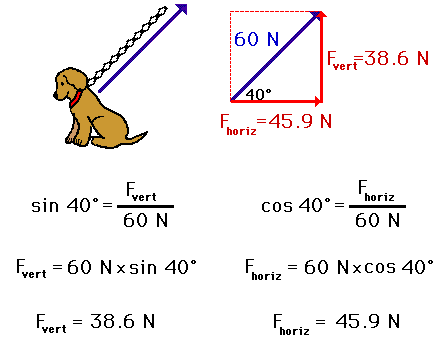The reversal of this process is called the resolution of forces. A force is usually resolved into two components that are perpendicular to each other.
A force can be resolved into two component forces graphically or by using trigonometry.
Consider the diagram above. In the diagram the force F is resolved into two perpendicular component forces that is the Fy and Fx components (using parallelogram method).
To calculate the magnitude of the vertical (Fy) and horizontal (Fx) forces, we can use simple trigonometry.
Fx = F cos θ , Since cos θ = (Fx/F)
Fy = F sin θ, Since sin θ = (Fy/ F)
Examples of calculation:
By using the diagram above, Let say F = 80 N and θ = 30 degree
The horizontal component Fx,
= F cos θ
= 80 cos 30
= 80 X 0.866
= 69.3 N to the right
The vertical component Fy,
= F sin θ
= 80 sin 30
= 80 x 0.5
= 40 N upwards
Another example would be as below:

Source: imgkid.com
Another good example:

Source: Physicsclassroom.com